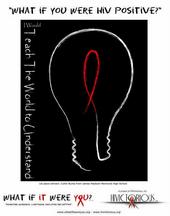My name is Amber. I made this site in honor of my sister.
I hate this disease, it took my Sister from me. I want it to stop, so know one has to feel this.
I find myself being one of those people that say "My sister didn't deserve Aids" because it was a transfusion or because she was a baby when she got it. BUT BOTTOM LINE no one deserves AIDS and we can stop it.
How HIV Is and Is Not Transmitted
HIV is a fragile virus. It cannot live for very long outside the body. As a result, the virus is not transmitted through day-to-day activities such as shaking hands, hugging, or a casual kiss. You cannot become infected from a toilet seat, drinking fountain, doorknob, dishes, drinking glasses, food, or pets. You also cannot get HIV from mosquitoes.HIV is primarily found in the blood, semen, or vaginal fluid of an infected person. HIV is transmitted in 3 main ways:Having sex (anal, vaginal, or oral) with someone infected with HIV
Sharing needles and syringes with someone infected with HIV
Being exposed (fetus or infant) to HIV before or during birth or through breast feeding.HIV also can be transmitted through blood infected with HIV. However, since 1985, all donated blood in the United States has been tested for HIV. Therefore, the risk for HIV infection through the transfusion of blood or blood products is extremely low. The U.S. blood supply is considered among the safest in the world.
click on banners below for more information:
Your risk of getting HIV or passing it to someone else depends on several things. Do you know what they are? You might want to talk to someone who knows about HIV. You can also do the following:Abstain from sex (do not have oral, anal, or vaginal sex) until you are in a relationship with only one person, are having sex with only each other, and each of you knows the other’s HIV status.
If both you and your partner have HIV, use condoms to prevent other STDs and possible infection with a different strain of HIV.
If only one of you has HIV, use a latex condom and lubricant every time you have sex.
If you have, or plan to have, more than one sex partner, consider the following:
Get tested for HIV
If you are a man who has had sex with other men, get tested at least once a year.
If you are a woman who is planning to get pregnant or who is pregnant, get tested as soon as possible, before you have your baby.
Talk about HIV and other STDs with each partner before you have sex.
Learn as much as you can about each partner’s past behavior (sex and drug use) and consider the risks to your health before you have sex.
Ask your partners if they have recently been tested for HIV; encourage those who have not been tested to do so.
Use a latex condom and lubricant every time you have sex.
If you think you may have been exposed to another STD such as gonorrhea, syphilis, or Chlamydia trachomatis infection, get treatment. These diseases can increase your risk of getting HIV.
Even if you think you have low risk for HIV infection, get tested whenever you have a regular medical check-up.
Do not inject illicit drugs (drugs not prescribed by your doctor). You can get HIV through needles, syringes, and other works if they are contaminated with the blood of someone who has HIV. Drugs also cloud your mind, which may result in riskier sex.
If you do inject drugs, do the following:
Use only clean needles, syringes, and other works.
Never share needles, syringes, or other works.
Be careful not to expose yourself to another person's blood.
Get tested for HIV test at least once a year.
Consider getting counseling and treatment for your drug use.
Do not have sex when you are taking drugs or drinking alcohol because being high can make you more likely to take risks.
